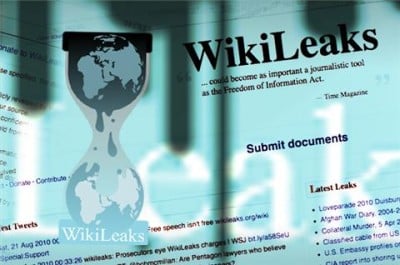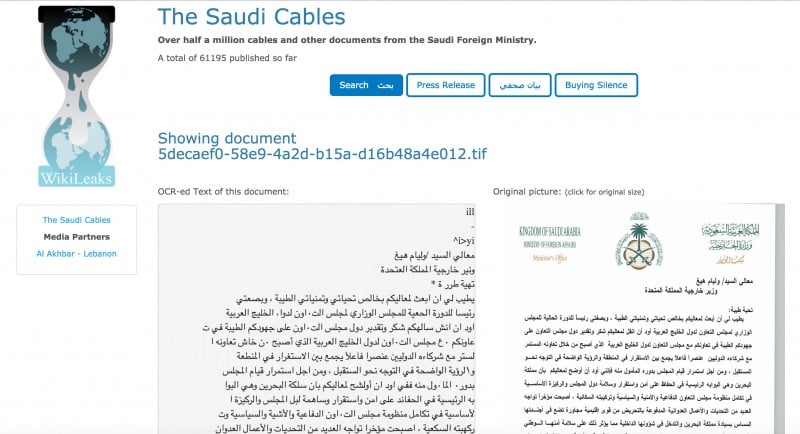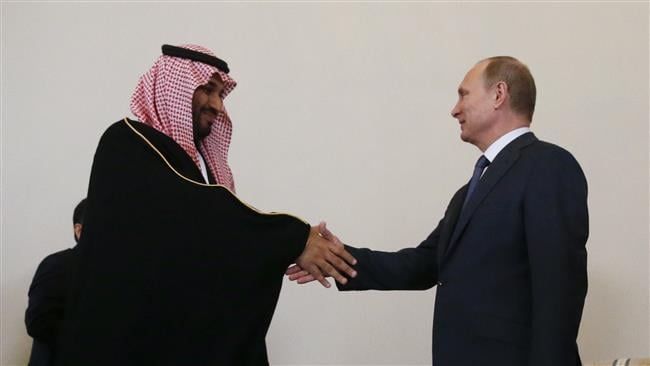The Ridiculous Nature of Saudi Intelligence:
What the Saudi Cables Released by WikiLeaks Say and Don’t Say

WikiLeaks released the first batch of the so-called “Saudi
cables” on June 19, 2015. By June 22, a total of 61,214 of the documents
were released online. More than half a million of these cables are in
the hands of WikiLeaks.
The documents are believed to have been hacked from the Saudi Foreign
Ministry in May 2015 by a group calling itself the Yemen Cyber Army as
retaliation to the House of Saud’s war against Yemen. The Yemen Cyber
Army probably is not Yemeni and almost certainly is an outward show for
another actor wishing to either penalize Riyadh or even possibly
manipulate it.
In the Arab World there is great interest about the documents. The Lebanese newspaper Al-Akbar
has also partnered itself with WikiLeaks to release the so-called Saudi
cables, as it has with previous leaks. The Saudi cables, however, do
not tell the world and Wikileaks readers anything new about Saudi
Arabia.
The Buying Influence of Riyadh’s Petro-Dollar
The House of Saud has characteristically tried to buy influence. It
wrongly believes that loyalty can be bought. Call them subsidies,
grants, bursaries, or business contracts: they are all forms of bribery.
Additionally, the cables confirm that the Kingdom of Saudi Arabia has
been spying on its citizens abroad, closely following Saudi university
students to see if they want changes in Saudi Arabia, watching
dissidents, trying its hardest to handicap Iranian interests,
destabilizing Iraq, helping the dictators of Bahrain, and using
Saudi-financed media to sanitize its image and deceive Arab audiences.
Again, none of this tells us anything new that we did not know about the
Kingdom and its decadent rulers.
The House of Saud’s Information War
The documents depict the House of Saud as waging a perpetual and
systematic campaign to influence and manage the media as part of a
vulgar perception management strategy. Not only are Saudi-owned media
outlets like Al Arabiya and Asharq Al-Awsat part of this, the
Saudi Ministry of Culture and Information has been central to this
policy of “buying influence” using the revenues from Saudi Arabia’s oil
sales.
The Saudi cables show that Riyadh’s rulers have used a gradient
strategy. The House of Saud’s media strategy starts with co-optation
through bribery by what we can call “agents of influence.” Agents of
influence can include diplomats, public relations firms, and lawyers.
The House of Saud has teams of lawyers, consultants, and public
relations firms constantly working for it and monitoring the media and
the House of Saud’s public image at all times.
It is the task of the agents of influence to find and contact the
media outlets reporting negatively about the House of Saud. In some
cases the agents of influence find them and in others Saudi officials in
Riyadh order the agents of influence to contact the third parties. The
preliminary task of the agents of influence is to “neutralize” the
negative reporting about the House of Saud. This is primarily done
through bribery. Riyadh has paid for massive subscriptions of Arab
newspapers in countries like Jordan, Lebanon, Kuwait, Syria, and
Mauritania as a means of inducing the publications to self-censor
themselves or to provide positive coverage about the House of Saud.
If bribery does not work then a strategy of “containment” involving
slander is applied followed by a strategy of “confrontation” that
involves litigation and sabotage. Both the containment and
confrontation strategies of the House of Saud involve falsely planting
stories under what is generally categorized as black propaganda. Aside
from promoting the image of the House of Saud, co-opted media outlets
are important for the strategies of containment and confrontation
because they launch attacks on those targeted by the House of Saud.
Targets have included Arab activists, Iran, Russia, Hezbollah, the
newspaper Al-Akbar, and Syria.
The Obvious versus the Unmentioned
Again, it has to be noted that it widely known that bribery has been
an important and central policy tool for the morally bankrupt Saudi
princes. It also has to be emphasized that the information about the
Saudi media strategy released by WikiLeaks is not a new revelation.
These Saudi activities have widely been recognized.
Nevertheless, Saudi Arabia has reacted to the release of the cables
by WikiLeaks by warning its citizens to refrain from reading the
documents. Riyadh has emphasized that ignoring the documents is a matter
of national security. It has also declared that the documents being
released by Wikileaks are doctored fabrications without even providing
one example.
What is missing from the Saudi cables that WikiLeaks released
heretofore are any documents about the House of Saud’s support for
Al-Qaeda and the other armed gangs that are wreaking havoc inside Syria,
Lebanon, and Iraq. This is important and noteworthy.
The Timing of the Release: Targeting Rapprochement between Moscow and Riyadh?
There are some very important questions to be asked and thought over
about the Saudi cables. Are the release of the Saudi cables retaliation
for Saudi aggression in Yemen or punishment for efforts by the House of
Saud to exert itself independently from Washington? Why is the crisis in
Syria and Saudi support for the foreign fighters ravaging Syria largely
left out of the leaks? If Saudi involvement in the fighting in Syria
was seriously mentioned in the cables released by WikiLeaks it could
incriminate other countries, such as the US, Britain, France, and
Turkey.
The release of the Saudi cables may hurt Saudi Arabia economically
and weaken its media strategy, which will lead to both economic and
political instability for the Kingdom as it increasingly fails to
control more information about the House of Saud’s actions. Furthermore,
the Saudi cables have been released on the eve of important talks and
negotiations between Saudi and Russian officials that follow agreements
and earlier talks between the Russian Federation and the Kingdom of
Saudi Arabia at the St. Petersburg International Economic Forum. The
bilateral talks are set to consolidate a series of agreements made on
cooperation and trade between the Kingdom and the Russian Federation
that will help boost the besieged Russian economy that Washington is
trying to crash. This is why it is important to think over the origins
and motives of the Yemen Cyber Army and ask who is pulling its strings?
Is a genuine Saudi adversary behind the Yemen Cyber Army or an unhappy
ally that wants to prevent any rapprochement between Saudi Arabia and
Russia?
One of the documents that is getting increasing
focus is an agreement between Russia and Saudi Arabia to vote for one
another to join the United Nations Human Rights Council in Geneva. Is it
a mere coincidence that UN Watch decided to focus on this agreement to
criticize Russia and even refers to it as a dictatorship in an article published
by Hillel Neuer on June 21,2015? Conversely, UN Watch has remained
silent about the multitude of similar agreements made by the US with the
House of Saud and other dictatorships. What has UN Watch said about
Bahrain or Gaza? Why does it oppose the Venezuelan government? In
reality, the goal of UN Watch has been to use the United Nations Human
Rights Council to further the interests of the US and Israel while it
undermines the body for criticizing Israeli human rights violations. UN Watch even helped legitimize the war on Libya by NATO in 2011 and has pushed for a war with Syria. Now it is targeting Russia.
Although Riyadh could be manipulating Moscow for Washington, joint
funds, space cooperation, nuclear agreements, investments, and arms
deals all seem to be in the works. The last time Saudi Arabia made
major deals with the Kremlin nothing came out of them, either because
the House of Saud was toying with the Russians or due to orders being
sent from the US to Riyadh.
The Ridiculous Nature of Saudi Intelligence
Another point that is worth mentioning is the unprofessional nature
of the Saudi intelligence structure. This is not new information either,
but it still worth mentioning. Reading the leaked documents it becomes
very clear that the Saudi intelligence structure is sloppy,
unsophisticated, and badly trained. The analyses made in the Saudi
intelligence reports are ridiculous and even rely on both tabloids and
unverified internet research from open sources.
A case in point is the Saudi intelligence report that mentions this author.
As one of the subjects inside the initial batch of Saudi cables that
WikiLeaks released, I took particular interest in looking over the Saudi
intelligence memorandum that I was wrongly mentioned in as “Mahdi
Nazemroaya Darius.” This particular Saudi intelligence memo relies on
internet research to look at the background of myself and several
colleagues who have pointed out how Saudi Arabia has supported terrorism
and worked with the US and Israel in a destabilization campaign in the
Middle East and North Africa.
Probably based on an assumption that I am of Iranian origin based on
the name Darius, the memo ambiguously and wrongly speculates that I
could “be working for Iran” without giving any context to what that
could mean. The description of others are also all vulgar caricatures
that simply refer to them as “anti-American” or “anti-Western.”
A Deficit of Critical Thinking in the Information Age
The type of misanalysis that is exemplified by Saudi intelligence
analysts is increasingly endemic of intelligence services and the
consultative firms that governments around the world, including in the
United States, are increasingly relying on. In this regard, it is worth
mentioning that this is actually the second time that I found myself
mentioned in a document released by WikiLeaks; the first time was in
2013 when WikiLeaks released a hacked email about the possible whereabouts of Muammar Qaddafi
from the Texas-based intelligence consultation company Strategic
Forecasting (Stratfor). Stratfor was also off. The Texas-based company
mistakenly listed me as an employee of the Associated Press inside Libya
during NATO’s bombing campaign while it was discussing the situation in
the Rixos Al-Nasr and making arguments based on association fallacies.
In regards to the Saudi intelligence memo, it is clear that no real
efforts were made to do proper background checks outside of the
internet. It makes one cynically ask if Saudi Arabia’s intelligence
structure does much more than police the Kingdom’s local population and
if it is the intelligence bodies of the US and other countries,
including Britain and Israel, that are doing most the important
intelligence work for Riyadh.
Looking over the documents released by WikiLeaks it becomes clear
that they confirm what is already known about the House of Saud and that
there is a serious problem of analysis in the organizational structures
of Saudi Arabia. A lack of critical thinking is not a problem that
money and bribery can solve either. With this type of mentality and lack
of analytical thinking about the world, it is of little wonder that
Riyadh got itself in a quagmire in Yemen. There, however, remain
important questions about the motives for the release of the Saudi
cables and about the background of the Yemen Cyber Army.


No hay comentarios:
Publicar un comentario